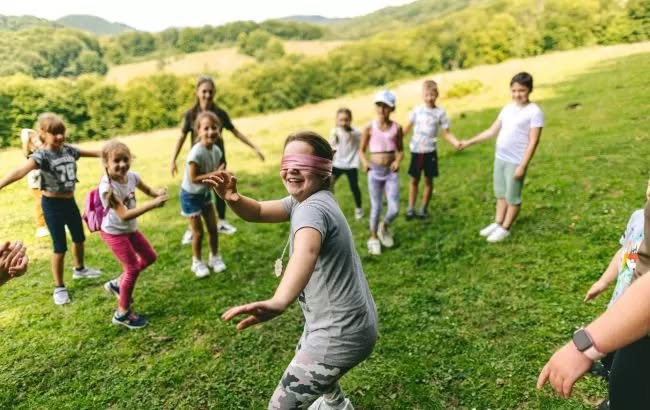Summer vacations are a time for children during the war to recover and improve their health: What adults can do

Summer vacations are not just a break from studying during the war, but also a need to restore strength and emotional balance. To do this, we need to create an environment for children that will help them increase their health reserves.
Studies by our Laboratory of the Social Determinants of Population Health at the State Institution «Marzieiev Institute for Public Health of the National Academy of Medical Sciences of Ukraine» show that such simple measures as maintaining optimal levels of physical activity, quality sleep, live communication, and outdoor walks are not just useful, but literally save children’s mental and physical health in the face of modern challenges.
We found that children were less likely to develop anxiety and depression:
- By 9% – with an increase in the duration of moderate and high intensity physical activity (which is most sports).
- By 16% – with an increase in sleep duration.
- By 21% – with a decrease in the duration of sedentary and semi-recumbent activities.
So, in the summer months, it’s time to provide for children:
✅ More movement
- Walks, games, sports, hiking – all of these significantly reduce anxiety and improve mood.
- A minimum of 260 minutes of walking per week, divided into 5 sessions, for children and 210 minutes, divided into 4 sessions, for adolescents. That is, at least 50 minutes per outing. Reaching or exceeding these thresholds reduces the likelihood of developing anxiety and signs of depression in children and adolescents by 5.6 times.
✅ Fewer screens mean more live communication. We have found that among adolescents who hardly ever communicate offline, two-thirds have symptoms of depression and more than 50% have symptoms of anxiety, which is more than 2 times higher than among those who communicate almost daily. Daily meetings of adolescents with friends reduce the chances of developing depressive symptoms by 2.6 times and anxiety by 2.2 times. At the same time, online communication is not a substitute for a personal meeting.
✅ Sleep and rest mode
- Optimal duration of night sleep: 8 hours for older students, 9 hours for students in grades 5-9, and 10 hours for younger students. Sufficient and quality sleep contributes to emotional stability.
What can adults do?
Parents:
- Take care of your own mental state, because anxiety and depression in parents directly affect children.
- Help the child to follow an optimal daily routine, not to isolate himself or herself, and to promote physical activity and walks.
Teachers and volunteers:
- Organize activities, even within the school grounds or community.
- Don’t forget about psychological minutes and support. We found that the chances of depression in schoolchildren were 28% lower when using “psychological minutes”.
Local authorities:
- To support families with children, organize children’s camps, sports and social initiatives, street events, and leisure areas.
So, summer vacation is a chance not only for rest, but also for recovery and rehabilitation of children living in the war realities. And we, adults, are able to help children.
More information about research on children’s health can be found on the page of the Laboratory of the Social Determinants of Population Health on the website of the SI «IPH NAMSU» (in Ukrainian).

The laboratory’s specialists continue researching the well-being of children during the war and the factors that affect their mental and physical health.
The next round of the online survey will run until June 11, 2025.
If you are parents/guardians of school-age children or teachers of general secondary education institutions, we invite you to take part in it. To do so, please follow the link:
online questionnaire 2025 for parents:
https://forms.gle/seKrNStvVq6yUCpk8
online questionnaire 2025 for teachers:
https://forms.gle/QJayPt6y5YcryuCi6
Head of the Laboratory of the Social Determinants of Population Health
of the State Institution «Marzieiev Institute for Public Health
of the National Academy of Medical Sciences of Ukraine»
Svitlana HOZAK
(date of publication on the website 03.06.2025)